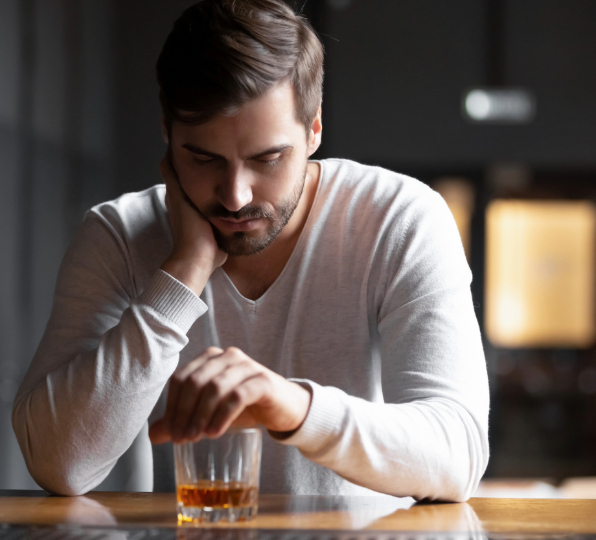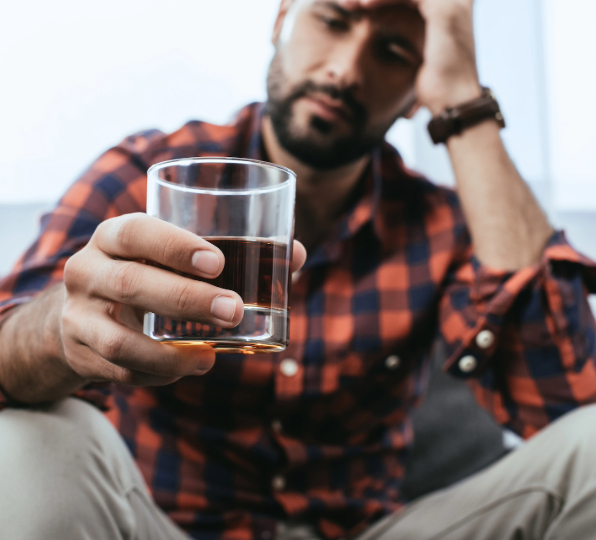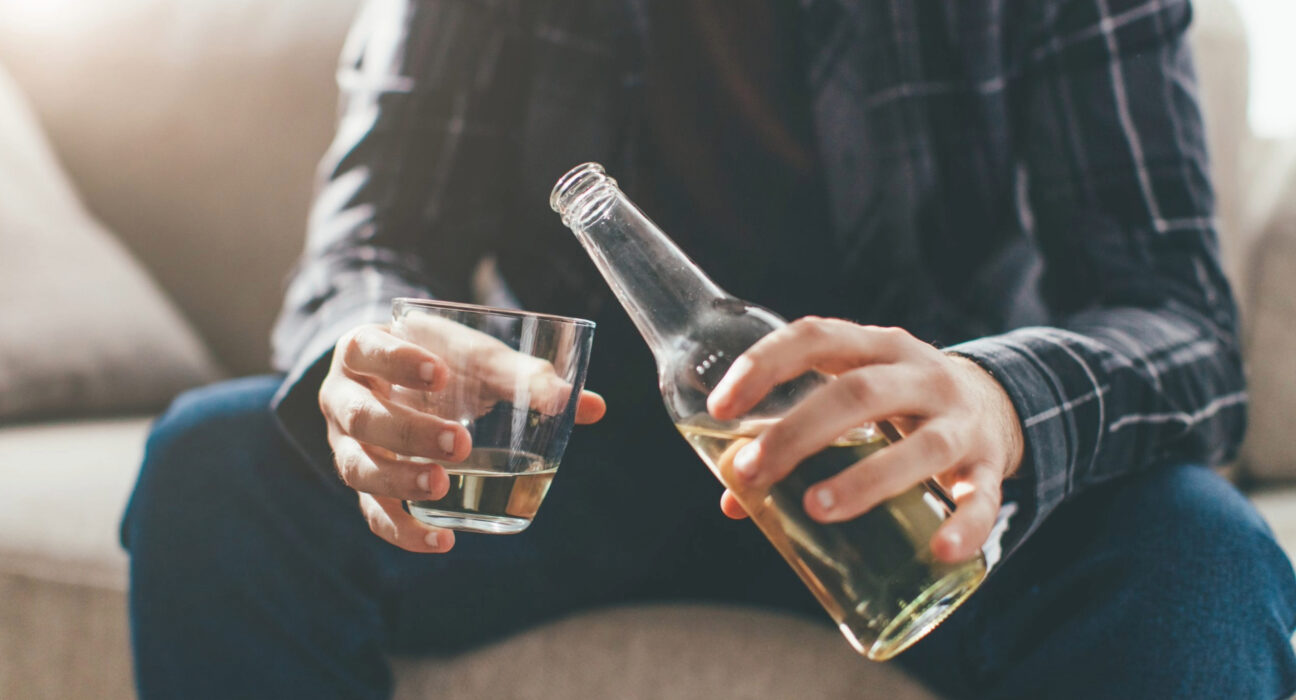Introduction:
It’s a common experience for many of us to feel anxious following a social drinking night. Alcohol is sometimes thought of as a relaxant, but after drinking it, anxiety levels can occasionally rise. In this blog post, we’ll examine the different causes of anxiety that some people may encounter after drinking and provide advice on how to deal with these emotions.
1. Alcohol as a Central Nervous System Depressant
At first glance, the relationship between alcohol and anxiety might seem paradoxical. After all, alcohol is widely recognized as a central nervous system (CNS) depressant, meaning it has a calming effect by slowing down brain activity. However, the complex interplay between alcohol and the brain can sometimes result in unexpected outcomes, including heightened anxiety.
Alcohol’s classification as a CNS depressant stems from its ability to inhibit the function of neurotransmitters, the chemical messengers that facilitate communication between neurons in the brain. Specifically, alcohol enhances the activity of gamma-aminobutyric acid (GABA), a neurotransmitter with inhibitory properties. By increasing GABA activity, alcohol dampens the excitability of neurons, leading to feelings of relaxation and sedation.
However, the calming effects of alcohol are not the whole story. As the body metabolizes and eliminates alcohol from the system, a rebound effect can occur, characterized by a surge in brain activity. This rebound effect, often referred to as “rebound excitation,” can lead to increased excitability of neurons and heightened levels of arousal.
In the context of anxiety, this rebound excitation can manifest as feelings of restlessness, agitation, and even panic. As alcohol’s sedative effects wear off, the brain attempts to compensate for the suppressed activity by increasing its excitability. This surge in neural activity can contribute to a state of hyperarousal, exacerbating feelings of anxiety and discomfort.
Furthermore, alcohol’s impact on other neurotransmitter systems, such as glutamate and serotonin, can also influence anxiety levels. Glutamate, the primary excitatory neurotransmitter in the brain, plays a key role in regulating arousal and stress responses. Alcohol’s inhibitory effects on glutamate transmission may contribute to the rebound excitation observed during alcohol withdrawal, leading to heightened anxiety.
Similarly, alcohol can disrupt serotonin signaling, a neurotransmitter implicated in mood regulation and emotional well-being. Chronic alcohol consumption has been associated with alterations in serotonin levels, which may contribute to the development of anxiety disorders in susceptible individuals.
It’s important to recognize that the relationship between alcohol and anxiety is multifaceted and can vary depending on factors such as individual differences, patterns of alcohol consumption, and underlying mental health conditions. While alcohol may initially provide temporary relief from anxiety symptoms, its rebound effects and long-term consequences can exacerbate anxiety over time.
2. GABA Receptor Modulation
Alcohol’s primary mechanism of action in the brain revolves around its interaction with the gamma-aminobutyric acid (GABA) receptors, which are integral to the regulation of neural activity and inhibition. GABA is the brain’s major inhibitory neurotransmitter, responsible for dampening neuronal activity and promoting feelings of relaxation and calmness. When alcohol enters the bloodstream and crosses the blood-brain barrier, it binds to specific sites on GABA receptors, enhancing the inhibitory effects of GABA.
By augmenting GABAergic neurotransmission, alcohol exerts a sedative and anxiolytic (anti-anxiety) effect, leading to feelings of relaxation and euphoria. This enhancement of GABA activity contributes to alcohol’s characteristic sedative properties, which can induce drowsiness, muscle relaxation, and a sense of tranquility.
However, the relationship between alcohol and GABA receptors is not without its consequences. As alcohol is metabolized and eliminated from the body, the temporary GABAergic enhancement it provides diminishes, leaving behind a state of GABA deficiency. This phenomenon, known as rebound excitation or withdrawal, can occur as soon as alcohol levels begin to decline, and its effects can be particularly pronounced in individuals who consume alcohol regularly or in large quantities.
The temporary GABA deficiency that occurs during alcohol withdrawal contributes to heightened neuronal excitability and hyperarousal, which can manifest as symptoms of anxiety. Without the inhibitory effects of GABA to counterbalance neuronal activity, the brain becomes more susceptible to excitatory signals, leading to increased arousal and feelings of tension or apprehension.
Moreover, chronic alcohol consumption can lead to adaptations in the GABAergic system, resulting in tolerance and dependence. Prolonged exposure to alcohol-induced GABA enhancement can alter the sensitivity of GABA receptors and disrupt the delicate balance of neurotransmitter signaling in the brain. Over time, this can contribute to the development of alcohol dependence and withdrawal symptoms, including rebound anxiety.
It’s important to recognize that the interplay between alcohol and GABA receptors is just one aspect of the complex neurobiology underlying alcohol’s effects on the brain and behavior. Other neurotransmitter systems, such as glutamate, dopamine, and serotonin, also play significant roles in mediating the effects of alcohol and contributing to its behavioral and psychological effects.
3.Dehydration and Electrolyte Imbalance
Alcohol’s impact on anxiety extends beyond its effects on neurotransmitter systems like GABA; it also influences physiological factors such as hydration and electrolyte balance. As a diuretic, alcohol promotes increased urine production, leading to fluid loss and potential dehydration. Dehydration, in turn, can exacerbate anxiety symptoms and contribute to feelings of unease, fatigue, and overall discomfort.
The diuretic properties of alcohol stem from its ability to inhibit the release of antidiuretic hormone (ADH), also known as vasopressin. ADH plays a crucial role in regulating water balance by promoting the reabsorption of water in the kidneys. When alcohol suppresses ADH secretion, the kidneys excrete more water, resulting in increased urine output.
This excessive urination can quickly lead to dehydration, especially when coupled with inadequate fluid intake. Dehydration occurs when the body loses more fluids than it takes in, disrupting essential physiological functions and affecting overall well-being. Common symptoms of dehydration include thirst, dry mouth, fatigue, dizziness, and dark-colored urine.
In the context of anxiety, dehydration can exacerbate symptoms and contribute to a sense of unease and discomfort. Research suggests that even mild dehydration can negatively impact mood and cognitive function, leading to increased feelings of anxiety and irritability. Dehydration may also amplify physical sensations associated with anxiety, such as rapid heartbeat, shallow breathing, and muscle tension.
Furthermore, dehydration can disrupt electrolyte balance, which plays a crucial role in nerve function, muscle contraction, and fluid balance. Electrolytes such as sodium, potassium, and chloride are essential for maintaining proper cellular function and regulating fluid levels in the body. Excessive fluid loss through alcohol-induced diuresis can disrupt electrolyte balance, leading to symptoms such as weakness, muscle cramps, and irregular heart rhythms.
Addressing dehydration and electrolyte imbalance is essential for managing anxiety symptoms and promoting overall well-being, especially for individuals who consume alcohol regularly or in excess. Hydrating adequately with water or electrolyte-rich beverages can help replenish lost fluids and restore electrolyte balance. Consuming electrolyte-rich foods such as fruits, vegetables, and nuts can also aid in rehydration and support overall health.
Moreover, moderating alcohol consumption and being mindful of hydration levels can help mitigate the diuretic effects of alcohol and reduce the risk of dehydration-related anxiety symptoms. Choosing non-alcoholic beverages or alternating alcoholic drinks with water can help maintain hydration and minimize the negative effects of alcohol on mood and well-being.
4.Impact on Sleep Patterns
Alcohol’s impact on sleep patterns is a critical aspect to consider when examining its relationship with anxiety. While alcohol may initially induce feelings of drowsiness and relaxation, its disruptive effects on sleep architecture can have significant implications for mental health and well-being, including exacerbating anxiety symptoms.
One of the key ways in which alcohol affects sleep is by altering the normal progression of sleep stages, particularly REM (rapid eye movement) sleep. REM sleep is crucial for cognitive function, emotional regulation, and memory consolidation. However, alcohol consumption has been shown to suppress REM sleep and increase the time spent in non-REM stages of sleep, particularly the early stages of sleep.
As a result, individuals who consume alcohol before bedtime may experience fragmented and disrupted sleep, characterized by frequent awakenings and difficulty maintaining deep, restorative sleep. This disruption of sleep continuity can lead to feelings of fatigue, grogginess, and impaired cognitive function upon waking.
Moreover, the impact of alcohol on sleep quality extends beyond its immediate effects on sleep architecture. Alcohol is also a potent diuretic, meaning it increases urine production and can lead to dehydration. Dehydration, in turn, can exacerbate feelings of unease, discomfort, and fatigue, amplifying anxiety symptoms and contributing to overall physical and emotional distress.
Additionally, alcohol’s effects on sleep are intertwined with its impact on the body’s circadian rhythm, the internal biological clock that regulates sleep-wake cycles. Regular alcohol consumption can disrupt the natural circadian rhythm, leading to difficulties falling asleep and staying asleep at the appropriate times. This disruption can further contribute to feelings of fatigue, irritability, and emotional instability, heightening vulnerability to anxiety.
Furthermore, the rebound effects of alcohol as it metabolizes and leaves the system can also disrupt sleep patterns. As blood alcohol levels decline, the body may experience a surge in sympathetic nervous system activity, leading to increased heart rate, sweating, and arousal. These physiological changes can disrupt sleep continuity and contribute to feelings of restlessness and discomfort.
5.Blood Sugar Fluctuations
The impact of alcohol on blood sugar levels is a significant factor to consider when examining its potential effects on anxiety. While alcohol is often associated with feelings of relaxation and euphoria, its influence on blood sugar regulation can lead to fluctuations that contribute to feelings of irritability, shakiness, and anxiety, particularly when consumed without food or on an empty stomach.
When alcohol is ingested, it undergoes metabolism in the liver, where it is broken down into various byproducts, including acetaldehyde and acetate. This process can interfere with the body’s normal mechanisms for regulating blood sugar levels, leading to both acute and prolonged fluctuations in glucose levels.
In the short term, alcohol consumption can lead to hypoglycemia, or low blood sugar levels, especially if consumed on an empty stomach or in large quantities. This can occur because alcohol inhibits the liver’s ability to produce glucose through a process called gluconeogenesis, while also increasing the release of insulin, the hormone responsible for glucose uptake by cells. As a result, blood sugar levels may drop below normal, leading to symptoms such as irritability, shakiness, confusion, and increased heart rate—commonly known as the “shakes.”
These symptoms of hypoglycemia can mimic the physical sensations associated with anxiety, exacerbating feelings of unease and discomfort. Moreover, the body’s stress response to low blood sugar levels can further amplify feelings of anxiety, creating a vicious cycle of physiological and psychological distress.
On the other hand, prolonged alcohol consumption or binge drinking can lead to hyperglycemia, or high blood sugar levels, due to the excess calories and carbohydrates in alcoholic beverages. Chronic alcohol consumption can impair insulin sensitivity and disrupt glucose metabolism, leading to insulin resistance and increased risk of developing type 2 diabetes over time.
Furthermore, alcohol’s impact on blood sugar levels can be exacerbated by other factors, such as inadequate nutrition, dehydration, and concurrent use of medications or recreational drugs. For individuals with preexisting anxiety disorders or other mental health conditions, these fluctuations in blood sugar levels can contribute to heightened feelings of anxiety and emotional instability.
6. Individual Variations
The relationship between alcohol consumption and anxiety is complex and multifaceted, with individual variations playing a significant role in determining how alcohol affects mental health. While some individuals may find that alcohol helps alleviate anxiety temporarily, others may experience heightened feelings of unease and distress after drinking. These differences in response to alcohol can be attributed to a variety of factors, including genetics, overall health, and tolerance levels.
Genetics plays a crucial role in shaping an individual’s response to alcohol. Variations in genes related to alcohol metabolism, neurotransmitter function, and stress response pathways can influence how alcohol affects the brain and body. For example, individuals with certain genetic variants may metabolize alcohol more slowly, leading to higher blood alcohol concentrations and prolonged intoxication. Others may have alterations in neurotransmitter systems, such as GABA and serotonin, that affect their susceptibility to alcohol-induced anxiety.
Moreover, overall health and underlying medical conditions can influence how alcohol impacts anxiety levels. Individuals with preexisting anxiety disorders or mood disorders may be more vulnerable to experiencing anxiety as a response to alcohol due to dysregulation of neurotransmitter systems and heightened sensitivity to stress. Chronic health conditions, such as diabetes, cardiovascular disease, and liver dysfunction, can also interact with alcohol consumption to exacerbate anxiety symptoms and increase the risk of adverse health outcomes.
Tolerance levels, or the body’s ability to adapt to repeated alcohol exposure, vary widely among individuals and can influence their response to alcohol over time. While some individuals may develop a tolerance to the anxiogenic effects of alcohol with regular consumption, others may experience increased sensitivity and heightened anxiety with continued use. Factors such as drinking patterns, frequency of alcohol consumption, and the presence of co-occurring substance use disorders can all impact an individual’s tolerance to alcohol and susceptibility to anxiety.
Furthermore, situational factors and psychosocial influences, such as peer pressure, social context, and past experiences with alcohol, can shape an individual’s perception of alcohol’s effects on anxiety. For example, social anxiety or performance anxiety may be exacerbated in social settings where alcohol is present, leading to increased reliance on alcohol as a coping mechanism and perpetuating a cycle of alcohol-related anxiety.
7. Underlying Mental Health Conditions
- For those with pre-existing anxiety disorders or mood disorders, alcohol can exacerbate symptoms. It may act as a temporary coping mechanism, but the rebound effect can intensify feelings of anxiety once the alcohol’s effects wear off.
Managing Post-Drinking Anxiety:
Understanding why post-drinking anxiety occurs is crucial, but equally important is finding effective strategies to manage these feelings. Here are some tips:
- Stay Hydrated:
- Consume water between alcoholic beverages and ensure you hydrate well the next day to counteract the dehydrating effects of alcohol.
- Eat Before and After Drinking:
- Having a substantial meal before drinking and eating a nutritious meal the day after can help stabilize blood sugar levels.
- Mindful Drinking:
- Be aware of your limits and pace yourself when drinking. Avoid binge drinking, as it can intensify both the immediate and delayed effects.
- Prioritize Sleep:
- Aim for a good night’s sleep by maintaining a consistent sleep schedule and avoiding alcohol close to bedtime.
- Consider Alternatives:
- Explore non-alcoholic alternatives or drink in moderation to minimize the impact on your mental well-being.
- Seek Support:
- If anxiety persists or worsens, consider seeking support from friends, family, or a mental health professional.


Conclusion:
While the relationship between alcohol and anxiety is complex, understanding the physiological and psychological factors at play can empower individuals to make informed choices. By adopting mindful drinking habits and incorporating self-care practices, one can enjoy socializing without succumbing to post-drinking anxiety. Remember, moderation and self-awareness are key to maintaining a healthy balance.












